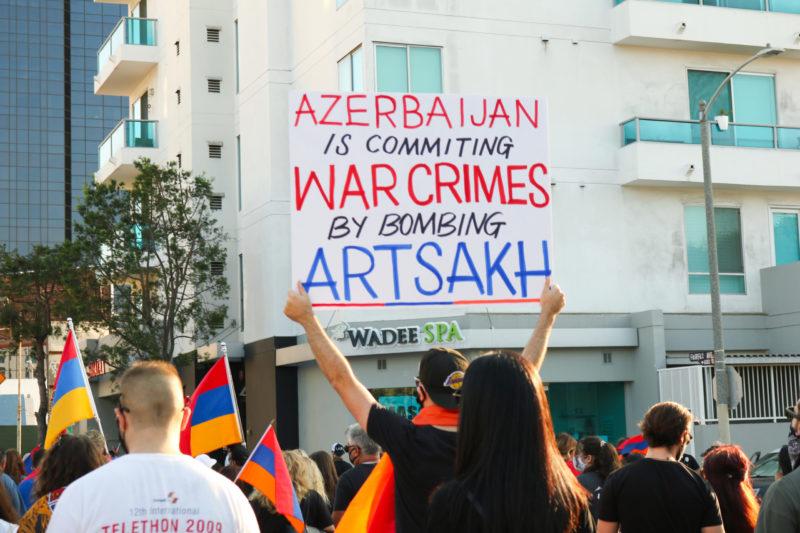
Not surprisingly, the main motive for the military aid is oil.
The Biden administration’s hypocrisy knows no bounds when it comes to human rights. Nearly every day, we hear pious condemnations of Russia and China for their human rights abuses—whether in Ukraine or toward the Uyghurs—and sermons about how the U.S. has to fight a new global war on authoritarian regimes.
At the same time, the U.S. continues to escalate its military operations in Ukraine, Somalia and in the Middle East, while supporting regimes notorious for human rights abuses like Saudi Arabia, which has waged a genocidal war on Yemen; and Rwanda, which is again on the assault in the Democratic Republic of Congo (DRC).
Completely overlooked is the Biden administration’s policy toward Azerbaijan, which is so bad that it has aroused opposition from such cheerleaders for U.S. foreign policy as Adam Schiff (D-CA), the former Chairman of the House Select Committee on Intelligence, and Robert Menendez (D-NJ), the Chairman of the Senate Foreign Relations Committee.[1]
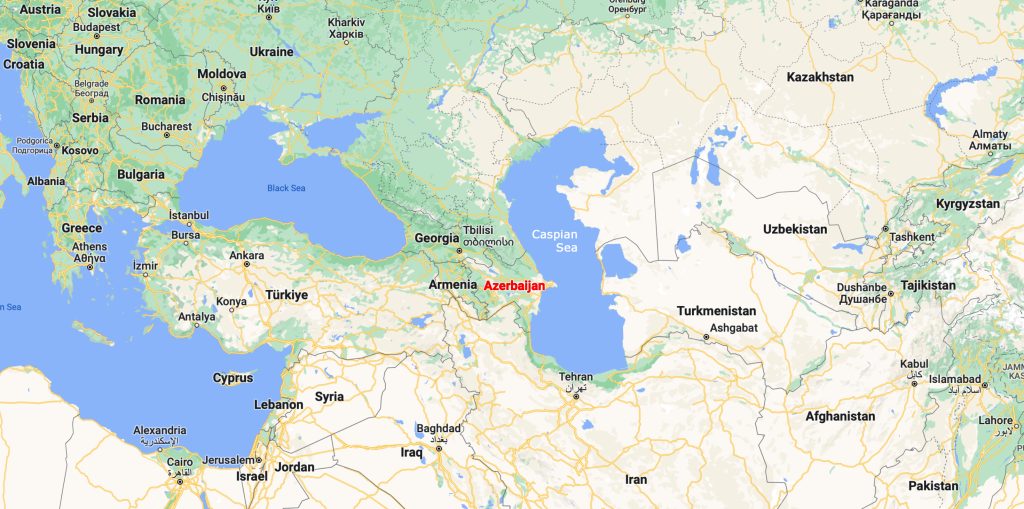
In the past month, the Biden administration has condemned a blockade imposed on the Armenian enclave of Nagorno-Karabakh by Azerbaijanis, while at the same time extending a waiver for the second year in a row allowing provision of $100 million in military aid to Azerbaijan that was restricted over Baku’s September-October 2020 conflict with Armenia over Nagorno-Karabakh.
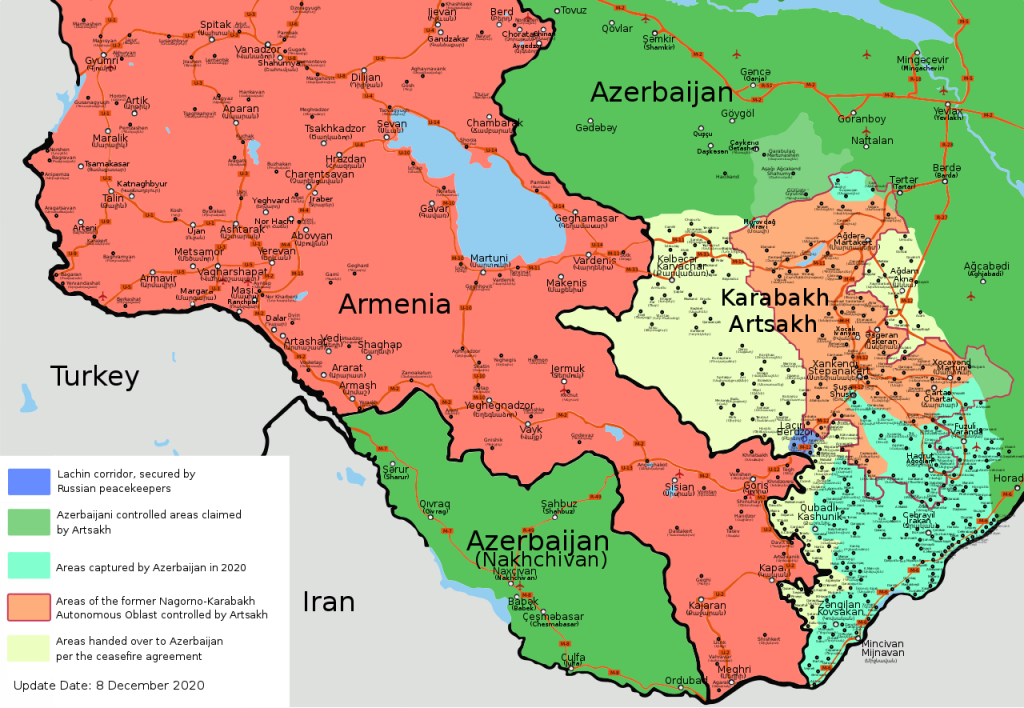
Initiated by protesters who allege that Nagorno-Karabakh’s self-proclaimed government is carrying out an illegal mining operation, the blockade—enabed by Russian peacekeepers who have done nothing to end it—is causing severe hardship for the people living there as a result of food and medicine shortages.
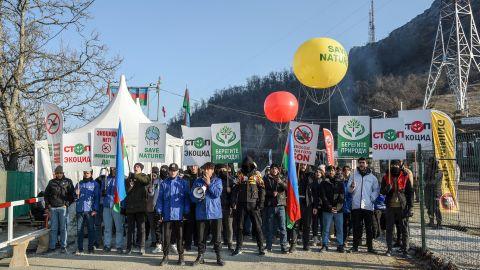
During the 2020 war, Azerbaijan had committed large-scale ethnic cleansing and war crimes that included the burning and destruction of villages. A Human Rights Watch on-site investigation in Stepanakert, Nagorno-Karabakh’s largest city, found numerous incidents in which Azerbaijan’s forces used cluster munitions and artillery rockets or other weapons that did not distinguish between military targets and civilians.
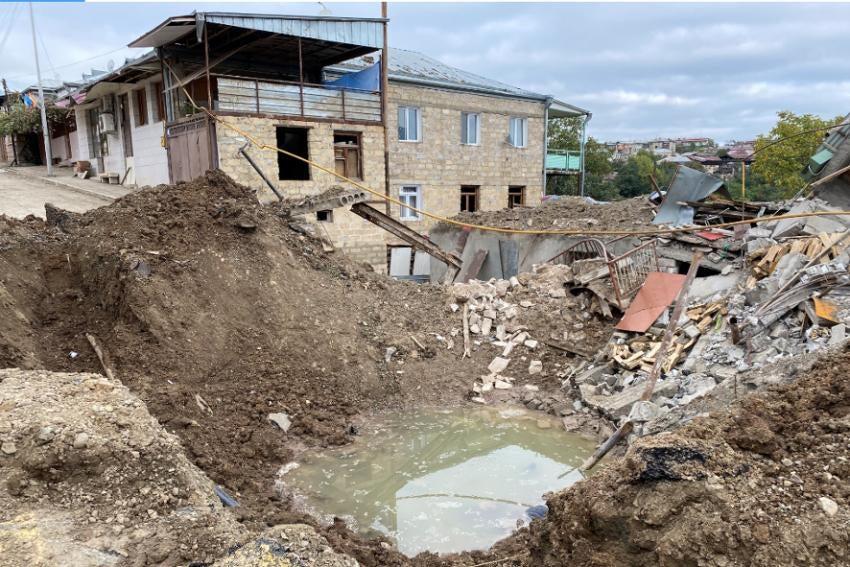
Hypocrisy 101
While campaigning for the presidency, the Biden-Harris campaign had released a statement condemning the Trump administration for inaction during the latter war. But Biden is not just inactive; his administration is directy complicit with Azeri crimes—as was Trump’s and Obama’s which also extended the waiver.
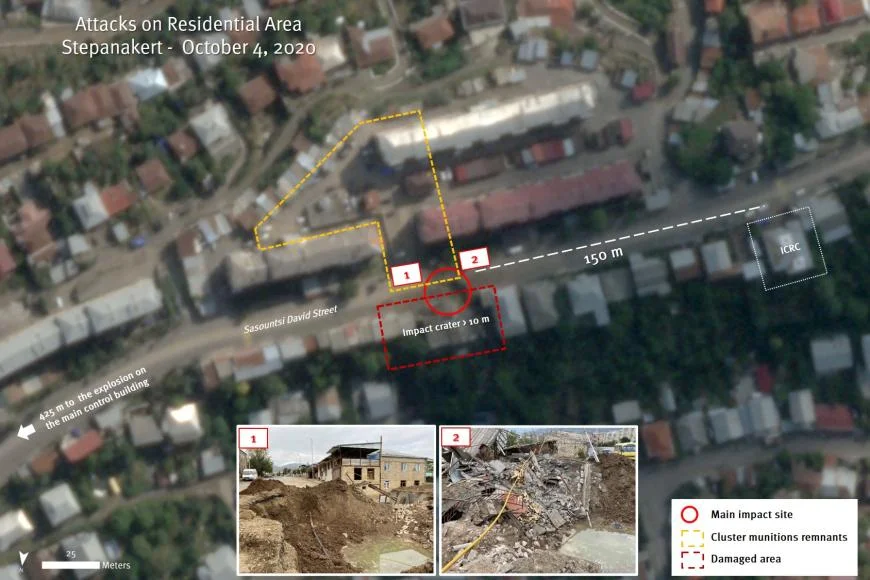
The waiver applies to Section 907 of the Freedom Support Act banning direct U.S. aid to Azerbaijan; it allows the U.S. to provide military assistance to Azerbaijan so long as the Secretary of State certifies that such assistance does not contribute to conflict in the region.
Once the U.S. provides military aid to a nation, however, it has no way of controlling how the weaponry will be used.
A Government Accountability Office (GAO) report confirmed that the Department of State and Pentagon have failed to meet statutory reporting requirements to Congress on the impact of U.S. assistance on the military balance between Armenia and Azerbaijan.

In the past U.S. military aid has extended to Azerbaijan’s border security police who are directly involved in the fight in Nagorno-Karabakh. The U.S. has also provided sophisticated communications and electronics equipment to Azerbaijan, and helped finance a naval buildup in the Caspian Sea, which has large oil deposits.
Robert Menendez stated: “As Azerbaijan continues to further occupy territory from its violent assault on Nagorno-Karabakh, during which more than 6,500 people died and more than 100,000 ethnic Armenians were displaced in 2020, it simply makes no sense to say that U.S. assistance and training has not impacted its military balance with Armenia.”
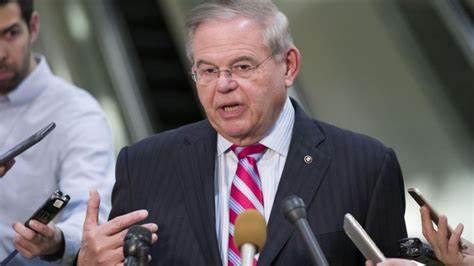
Another Resource War
Filmmaker Peter Bahlawanian, who has produced a series of documentaries on the Nagorno-Karabakh conflict and is working on a documentary on the Aliyev dynasty in Azerbaijan, told CovertAction Magazine in an exclusive interview that the Biden administration’s policy was “hypocritical in condemning the blockade while sustaining $100 million in arms shipments.”

The reason they were doing it, he said, was “to fight Iran. Azerbaijan and Turkey are allies and both are against Iran. However, they can use U.S. weapons to fight Armenians and further the Azeri goal of taking control of the lands around Artsakh [Nagorno-Karabakh].”
According to Bahlawanian, these lands are especially valued today because they “were found to be sitting on minerals from which they could make microchips. The Azeris have even made prearranged deals—for example with the Anglo-Asian Mining Company [on whose board sits John Sununu, former New Hampshire Governor and George H.W. Bush’s Chief of Staff], which paid them millions of dollars ahead of time.”

Azeri leader Ilham Aliyev “feels that he can do whatever he wants in Artsakh,” Bahlawanian said, “because he is supported by Turkey, which helps with war planning and provides Aliyev with drones that can be used to access remote mountainous regions in Artsakh.”
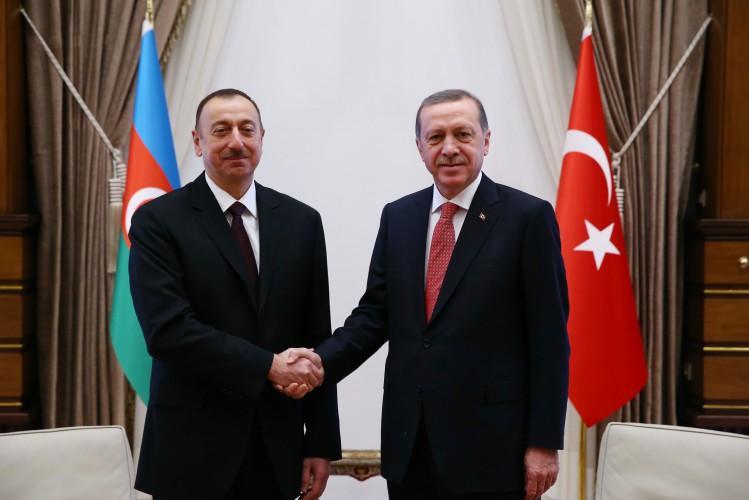
Also, whereas Russia in the past supported the Armenians and was supposed to be acting as peacekeepers, they have backed off more recently and allowed the blockade to go forward because they increasingly ship oil through Azerbaijan to get around Western sanctions and have soured on Armenia’s current Prime Minister, Nikol Pashinyan.
He came to power in a Western-backed color revolution in 2018 and has sought to ally Armenia with India and the West.[2]
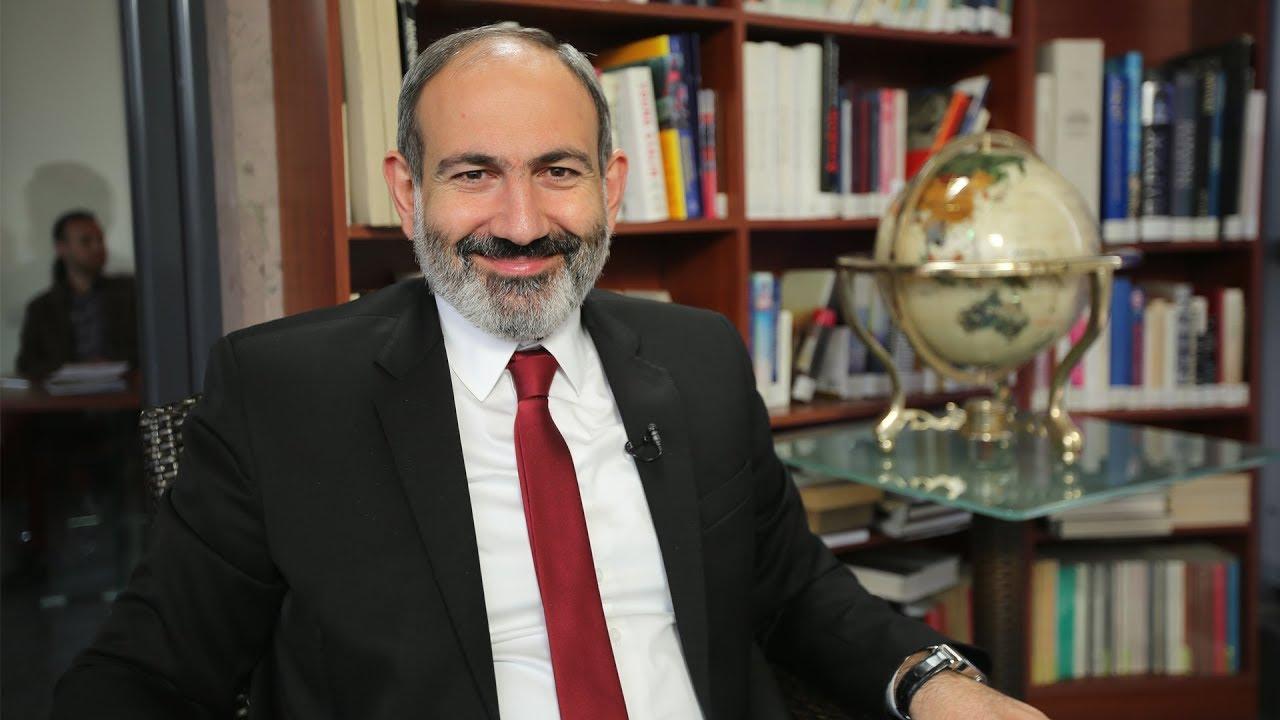
The U.S. for its part continues the $100 million in annual arms supplies to the Azeris because, since the 1990s, it has secured lucrative concessions for oil exploration and, according to Bahlawanian, has significant business investment in Azerbaijan.
Overlooked is not only Azerbaijan’s ugly record in Nagorno-Karabakah but also its domestic repression: Foreign Policy Magazine reported in 2015 that it had twice as many political prisoners as Russia and Belarus combined.[3]
Israeli Support
Israel has also provided significant military support to Azerbaijan, which provides Israel with about 40% of its oil imports.
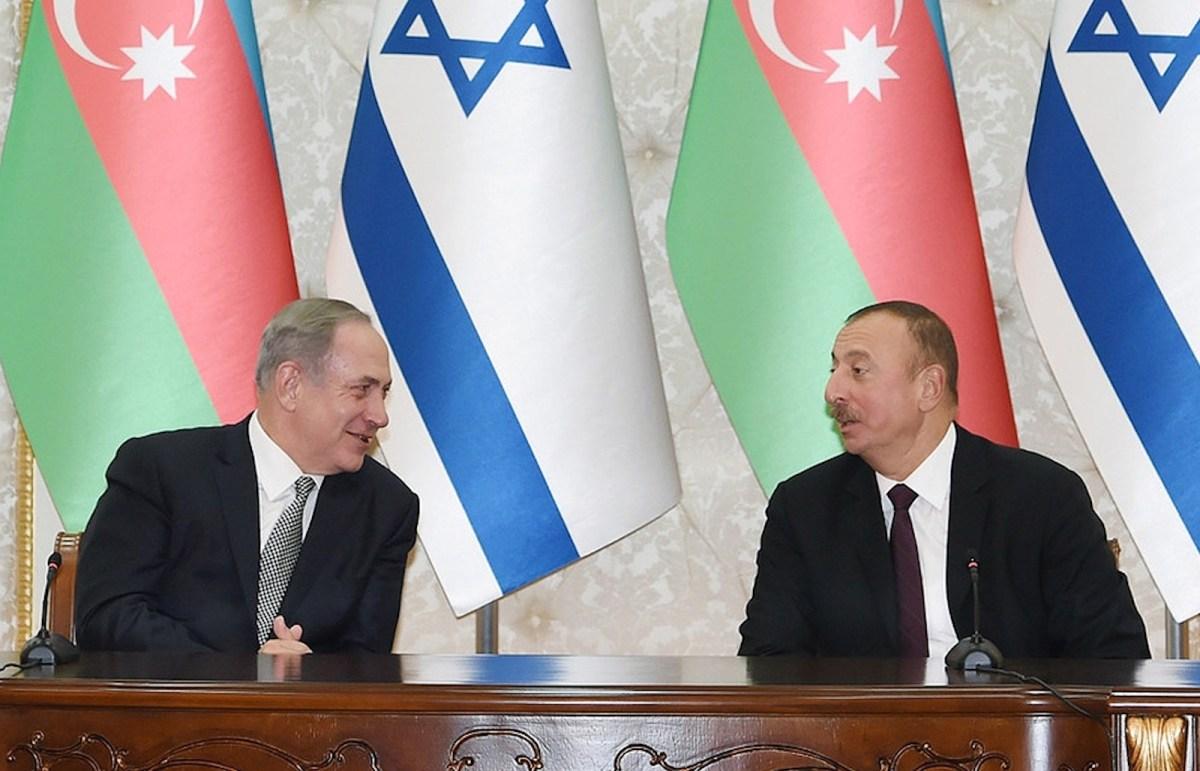
During the 2020 war in Nagorno-Karabakh, Israel provided the Azeris with “suicide drones” that are destroyed upon impact and cluster munitions, which were dropped on civilian areas.
A senior source in the Israeli Defense Ministry told the Asia Times that “Azerbaijan would not be able to continue its operation [against the Armenians in Nagorno-Karabakh] at this intensity without our support.”
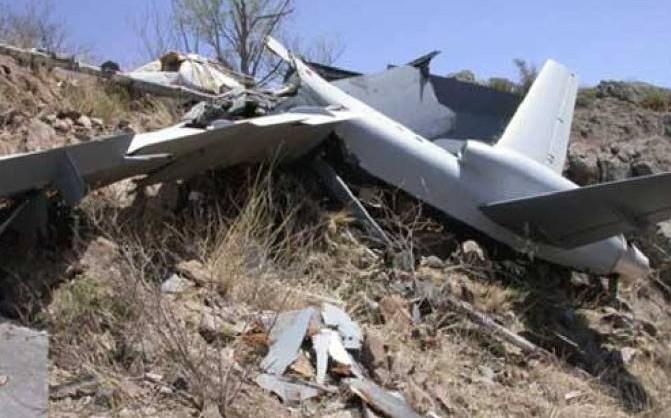
Vitally Important Cork in the Bottle
Zbigniew Brzezinski, Jimmy Carter’s National Security Adviser, described Azerbaijan in his 1997 book The Grand Chessboard as the “vitally important cork in the bottle containing the riches of the Caspian Sea Basin and Central Asia.”[4]

In September 1995, Brzezinski was asked to carry a letter from President Bill Clinton to Azerbaijan’s President Heydar Aliyev asking him to give the U.S. preference to two pipelines, which could transport oil through Turkey while bypassing Russia and Iran (one, the Baku-Tbilisi-Ceyhan pipeline, was completed in 2005). In return, Clinton said he promised to resolve the dispute over Nagorno-Karabakh, which had resulted in more than 30,000 dead at that time.[5]
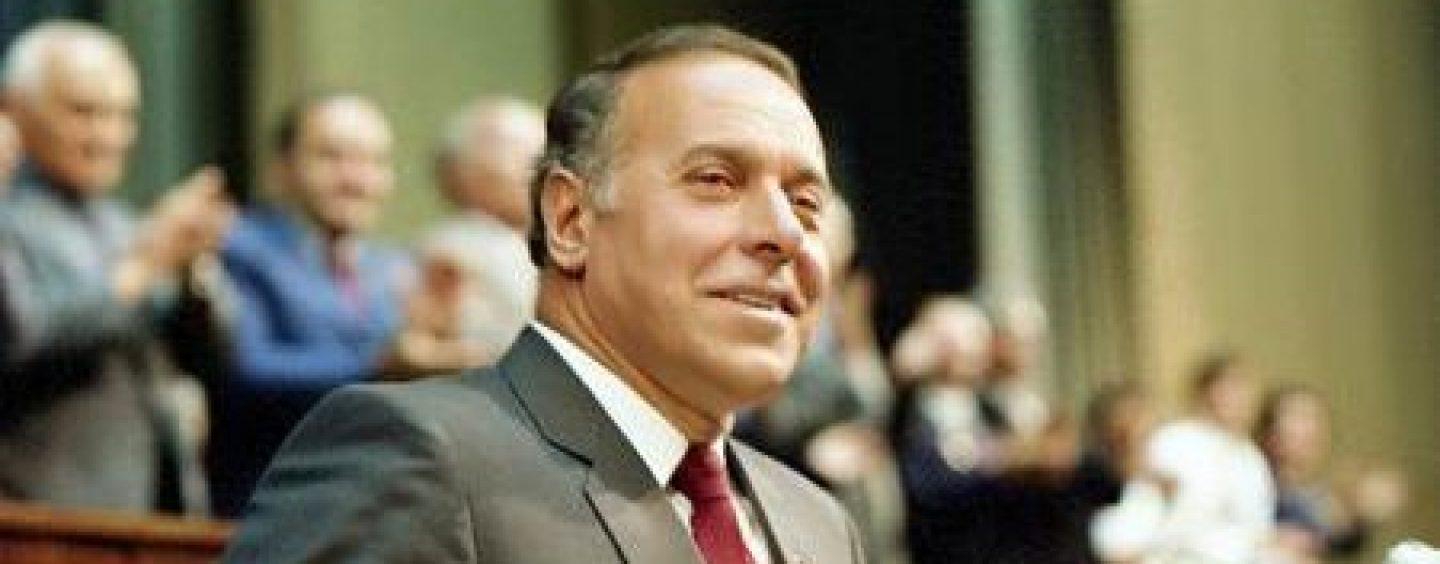
When Aliyev led an armed uprising in 1993 against Azerbaijan’s elected president, Abulfaz Elchibey, he was assisted by mercenaries in the employ of Mega Oil, which had employed veterans of the secret war in Laos and the Iran-Contra affair, notably Richard V. Secord and “Heinie” Aderholt.[6]
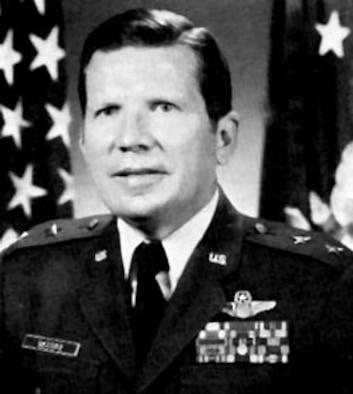

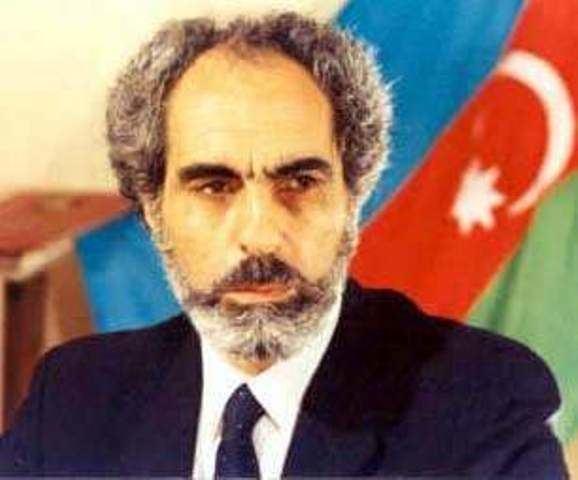

In 1994, Aliyev signed what he called the “deal of the century,” in which a consortium called the Azerbaijan International Operation Company (AIOC) agreed to spend $7.4 billion to develop three major oil fields in the Caspian Sea: Azeri, Chirag and Guneshli. The Soviets had banned off-shore drilling in the Caspian Sea, which had been designated as a nature reserve and possessed some of the world’s largest freshwater fish.[7]
U.S. companies—Amoco, McDermott, Unocal, and Pennzoil—collectively took more than 40% of the king’s ransom, by far the largest share, with Exxon joining AIOC the following year.
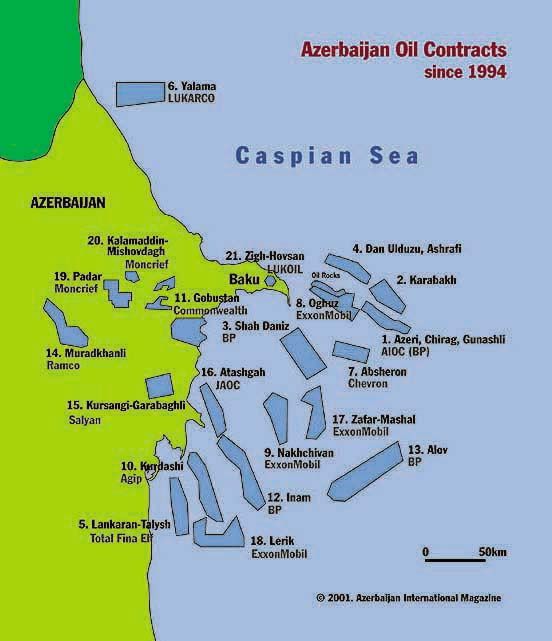
In 1996, Clinton had received Aliyev at the White House with full honors, witnessed the signing of a new Amoco oil exploration deal and promised to lobby Congress to lift economic sanctions on Azerbaijan, which had been imposed because of its war with Armenia.[8] Clinton said that, “by working closely with Azerbaijan to tap the Caspian’s resources, we not only help Azerbaijan to prosper, we also help diversify our energy supply and strengthen our energy security.”[9]
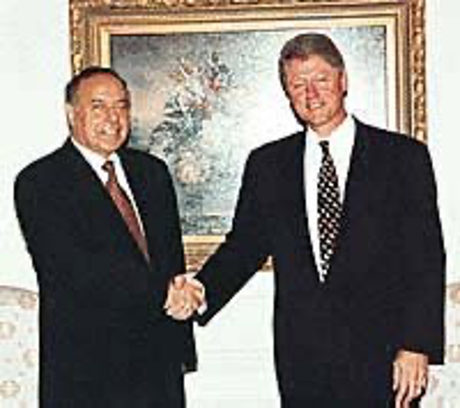
Aliyev on the same visit met with Defense Secretary William Cohen to discuss stronger U.S.-Azerbaijani defense cooperation and possible American training of the Azerbaijani army.[10]
U.S. security ties to Azerbaijan increased under the rule of Heydar’s son, Ilham (2003-present), who actively participated in NATO’s Partnership for Peace Program, and provided overflight, refueling, and landing rights for U.S. and coalition aircraft bound for Afghanistan and Iraq, while allowing fuel, clothing, and food used by the U.S. military in Afghanistan to travel through Baku.
Several hundred Azeri forces also served in Afghanistan and Iraq in support of U.S. war aims.
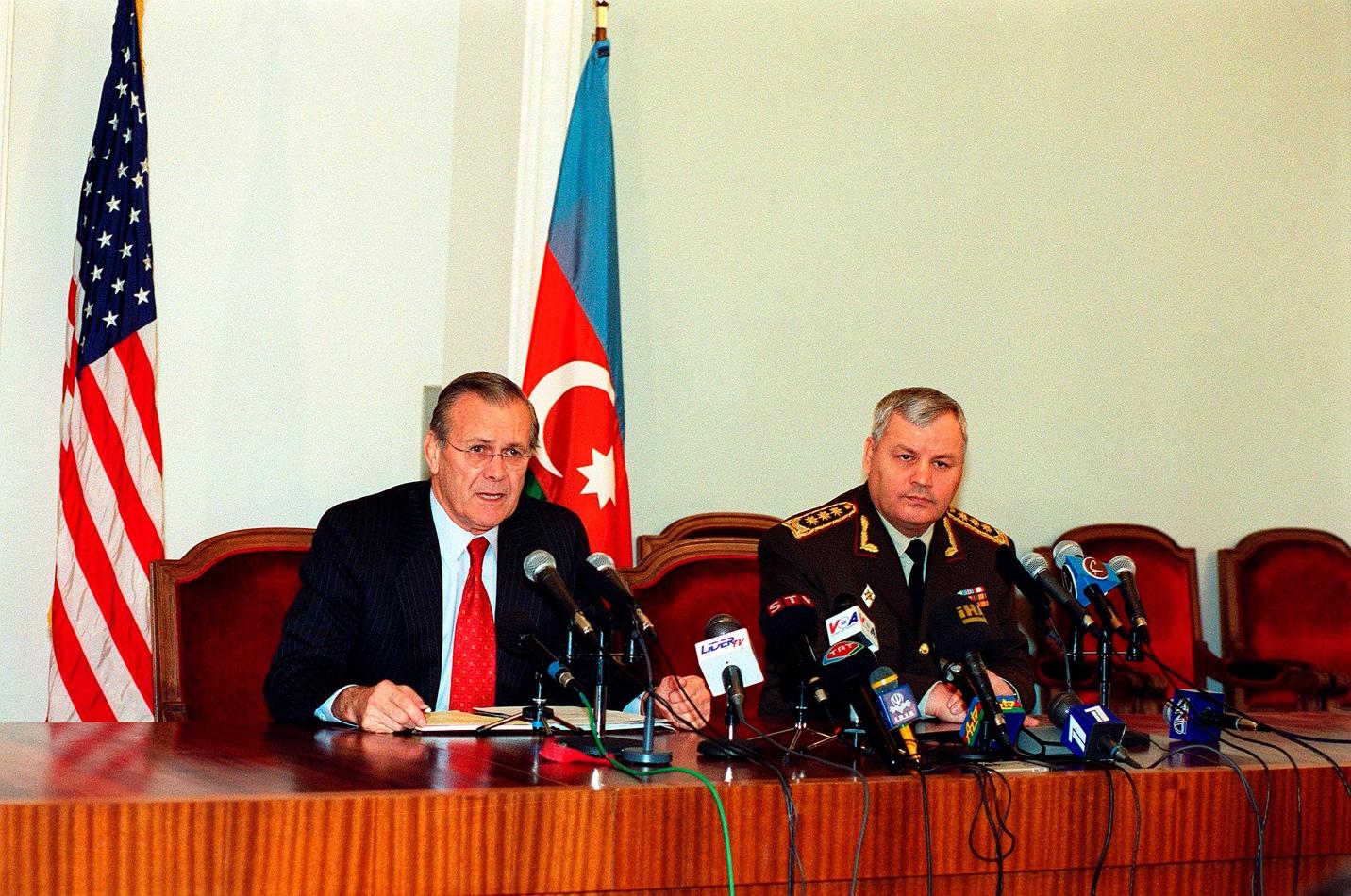
As part of the quid pro quo, the U.S. helped train Azerbaijani naval special forces and donated patrol boats, largely in an attempt to try to help Azerbaijan stand up for itself against Iran’s military presence in the Caspian Sea.[11]
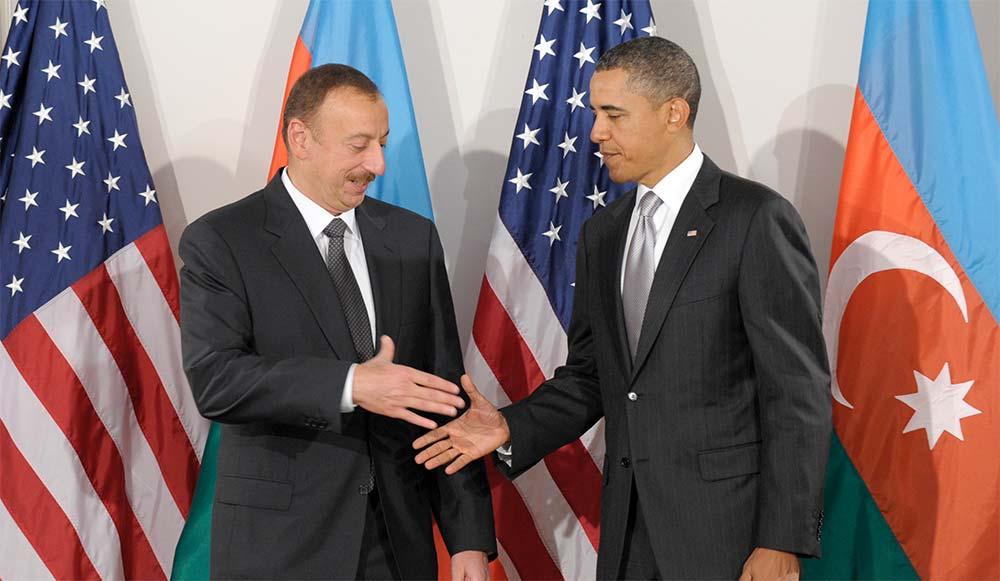
Azeri Lobby
Foreign Policy Magazine reported in 2015 on the Azeri lobby which had spent $4 million in the past year papering over the Aliyev regime’s dismal human rights record by presenting itself to the United States as a loyal partner in the “War on Terror,” a stalwart friend to Israel, and an important energy supplier.
That February, the Azerbaijani embassy increased the monthly retainer of its main lobbyist, the Podesta Group, from $50,000 to $75,000. The Podesta Group’s filings revealed hundreds of contacts with congressional offices, executive branch agencies, members of the media, and think tanks—which offered a powerful counter to the Armenian lobby, which also exercises considerable clout in Congress.
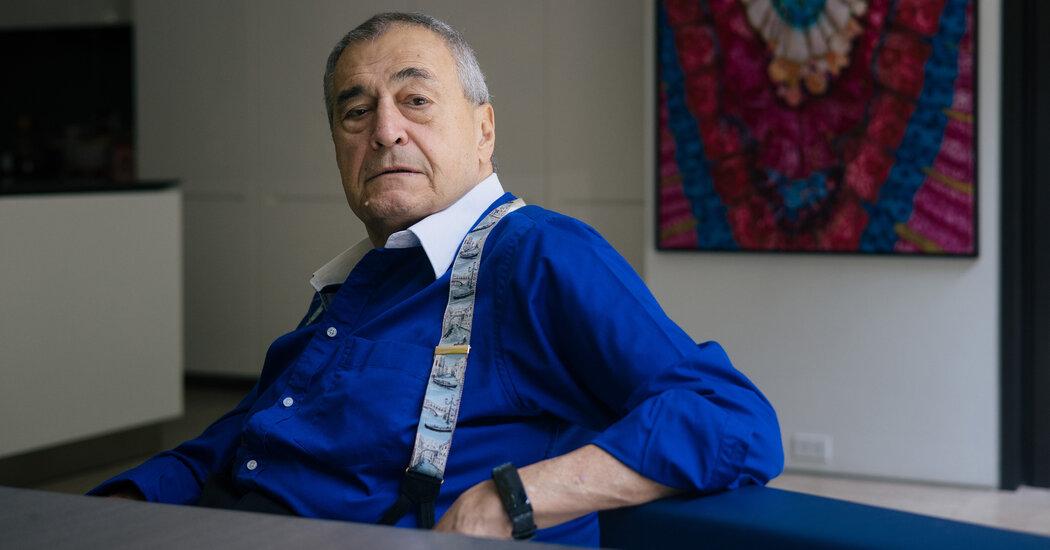
A congressional staffer who wished to remain anonymous described receptions organized by pro-regime groups, such as the Azerbaijan America Alliance, where up to 20 members of Congress at a time would “line up at the podium” waiting for their turn to praise Azerbaijan for its economic successes, its partnership with the United States, and its friendship with Israel.
Emin Milli, an Azerbaijan activist who spent 17 months in prison on trumped up charges, said that when a U.S. congressman praised the Aliyev regime, they were “confirming the legitimacy of a mafia. The legitimacy of thugs. The legitimacy of a group of people who kill, torture, and put people in jail just for expressing their opinion.”
Dire Humanitarian Crisis to Which Nobody Is Paying Attention
In his interview with CAM, Peter Bahlawanian emphasized the cruelty of Azeri blockade of Artsakh, which is designed to isolate and starve the people into submission.
“Azeris are taught to hate the Armenians from a young age; like Jews in Nazi Germany; to view them as subhuman,” Bahlawanian said. “In September they were planning to invade Artsakh but when Nancy Pelosi [who is backed by the Armenian lobby] made a surprise visit to the region they held back. So they are trying another approach with this blockade; trying to starve the people by blocking food and medicine. Artsakh is a very mountainous area that is difficult to get to generally, and now it has become like a refugee camp. Aliyev has said that ‘we’ll give the right of passage to those who want to leave.’ This is because he wants to take over the land.”
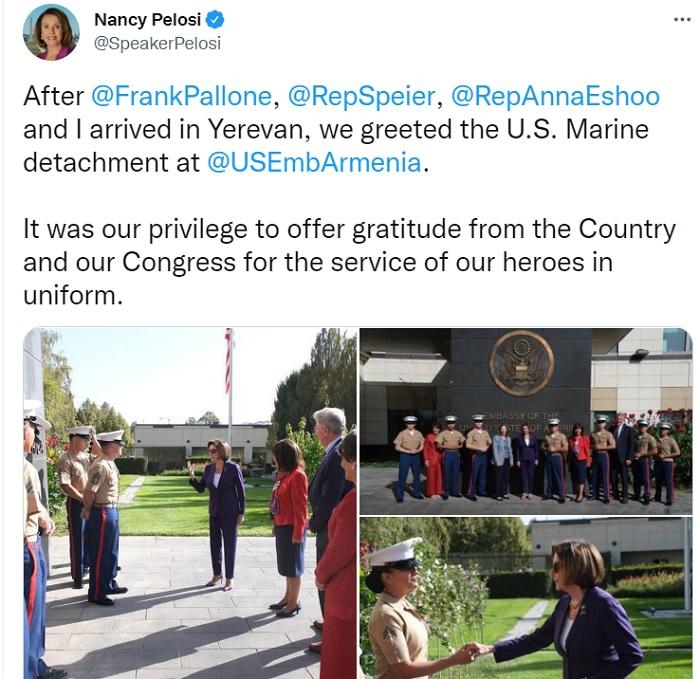
Azeri Claims
The Azeris have defended their actions by noting that the UN Security Council has repeatedly condemned Armenia’s invasion of Azerbaijan and that Armenia occupied Nagorno-Karabakh along with one-fourth of Azeri territory, while the Azeris never occupied any Armenian territory.
After the dissolution of the USSR, Azerbaijan and Armenia were recognised as independent states with their Soviet-drawn borders, with international law recognizing Nagorno-Karabakh as Azerbaijan’s sovereign territory and the presence of Armenian military forces as occupation. Azerbaijan in turn has the right, under Article 51 of the Charter of the United Nations, to act in self-defense.
Azeris claim to have been victims of Armenia army atrocities and became refugees along with thousands of Kurds who had to flee the old Kurdish capital of Lachin after Armenian forces set it ablaze in the 1992-1994 war over Nagorno-Karabakh.[12]
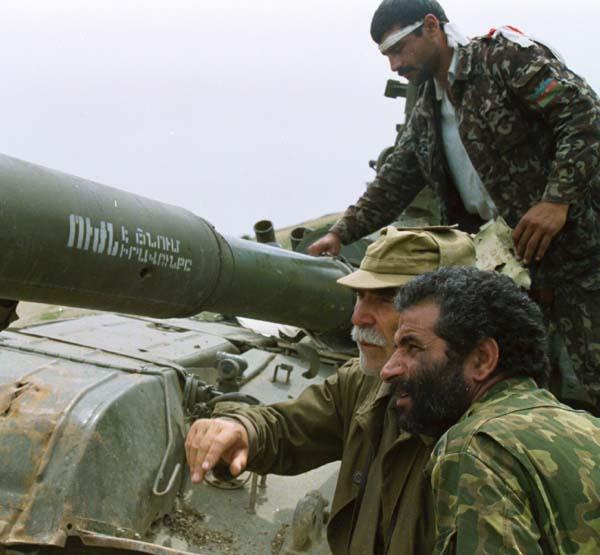
The latter war, they say, was triggered when Armenian forces invaded the region as the USSR was falling apart, carrying out a massacre of the civilian population of the Azerbaijani city of Khojaly and ethnically cleansing Azerbaijanis.
Recent negotiations have been impeded because of the refusal of Armenian President Nikol Pashinyan to consider the return of any occupied territories to Azerbaijan.
Rebuttal
In his interview with CAM, Bahlawanian countered the Azeri narrative by emphasizing that the people of Artsakh (Nagorno-Karabakh) voted overwhelmingly (99%–with 87% voter turnout) for their autonomy from Azerbaijan in a 1991 referendum before the fall of the Soviet Union.
Bahlawanian also said that Armenian leaders did not want to incorporate Artsak into Armenia in the past because they did not want to alienate the Russians who, since the Stalin era, had wanted to keep Armenia divided and weak so they could better control it.
The Desire to Live
Bahlawanian’s 2021 documentary “The Desire to Live”—which has been accepted at 150 film festivals and won 136 awards—juxtaposes the beauty of Artsakh and its mountainous terrain with the brutality of the Azeri attack during the 2020 war.
The film includes interviews with people living in small villages in Artsakh who experienced horrible atrocities and the deaths of loved ones and chronicles their struggle to stay alive.
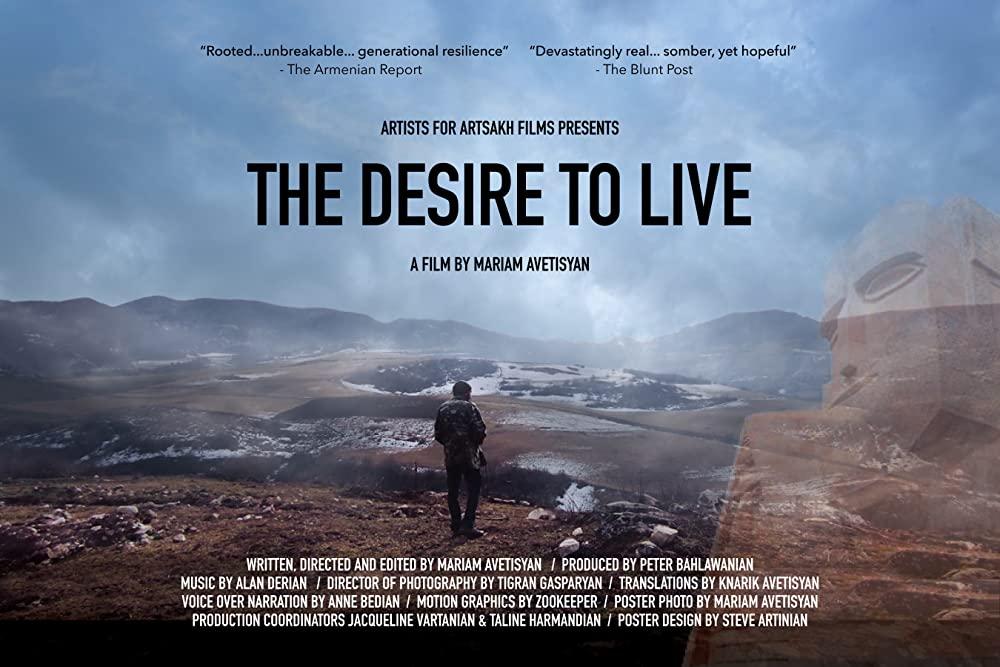
One woman who worked at the hospital in Artsakh during the Azeri onslaught said that she saw scenes out of a horror movie: wounded patients with missing arms and jaws and eyes hanging out that gives her nightmares to this day.
Another man from the Karmar Shuka village, who had worked for 37 years at the power station and suffered shrapnel wounds, said that the village had once been a nice place; its vineyards even produced vodka. But since the wars came, much has been burned—including his own house—and life is now extremely difficult. At 82, his main hope is for a peaceful life for his 11 grandchildren and seven great-grandchildren and that they have a way to earn a living.
Despite the atrocities and hardships that they had faced, many of the people interviewed in the film were defiant: One said that “their village,” whatever weapons were brought to bear on it, would “never be defeated,” while another rued how the rest of the world had forgotten about the people of Artsakh and thrown them “under a bus.”
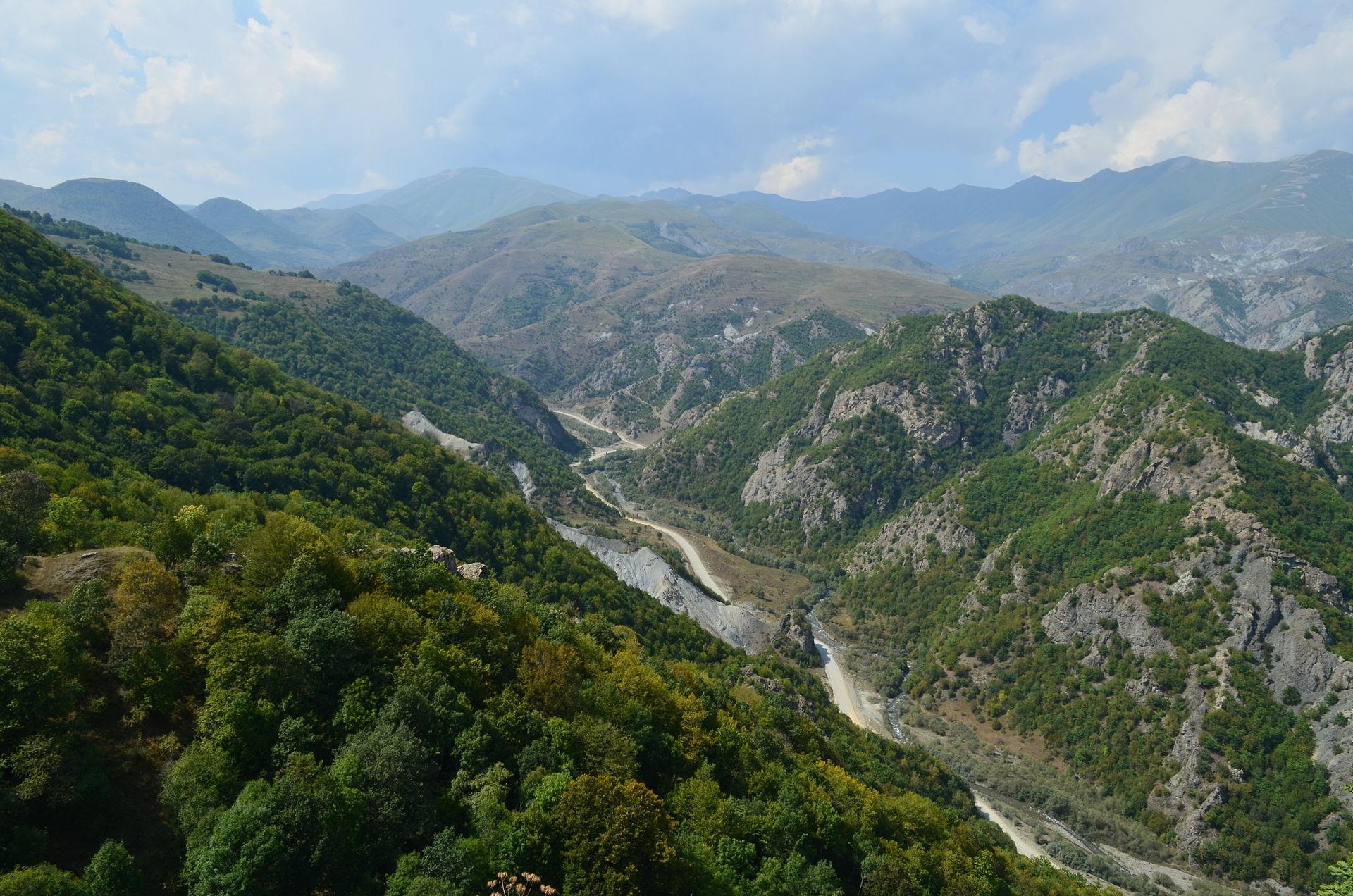
Religious Dimension to War
One thing that comes out in the film is the religious component of the war: The Armenians are Christians while Azeris are predominantly Muslims.
Bahlawanian told CAM that, during the 2020 war, the Azeris had employed ex-Syrian jihadists, Hezbollah veterans and al-Qaeda to fight the Armenians in Nagorno-Karabakh.
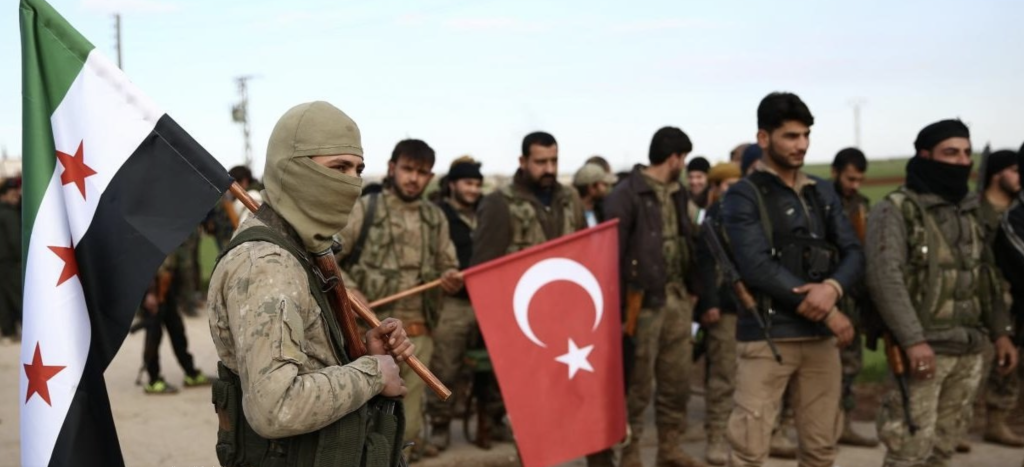
In the 1990s, Afghan mujahadin fighters were also used by the U.S. to foment the coup that brought Aliyev to power.
So the U.S. is again on the side of radical Islam when they are supposedly fighting a War on Terror.

-
Both Schiff and Menendez have long standing connections to the Armenian lobby; so their position may not be motivated by altruism but rather political calculation. ↑
-
As a telling sign, the National Endowment for Democracy (NED) has poured a lot of money into Armenia to shore up “civil society” since that time. ↑
-
Aliyev is further incredibly corrupt, owning gold mines and investing in offshore tax havens, as was exposed by revelations of the Panama Papers. ↑
-
Zbigniew Brzezinski, The Grand Chessboard: American Primacy and Its Geostrategic Imperatives (New York: Basic Books, 1998), 46. ↑
-
Dan Morgan and David B. Ottaway, “Pipe Dreams—The Struggle for Caspian Oil,” The Washington Post, October 4, 1998, A1. ↑
-
Alexis Rowell, “U.S. Mercenaries Fight in Azerbaijan,” CovertAction Quarterly, Spring 1994, 23-25. ↑
-
Lutz Kleveman, The New Great Game: Blood and Oil in Central Asia (New York: Grove Press, 2004), 78, 79. ↑
-
Morgan and Ottaway, “Pipe Dreams – The Struggle for Caspian Oil”; Galib Bashirov, “U.S. Foreign Policy Towards Azerbaijan, 1991-2015,” Ph.D. Thesis, Florida International University, 2017. ↑
-
Peter Dale Scott, The Road to 9/11: Wealth, Empire and the Future of America (Berkeley: University of California Press, 2007), 165. ↑
-
Stephen Kinzer, “Azerbaijan Has Reason to Swagger: Oil Deposits,” The New York Times, September 14, 1997. The UN Security Council in 1993 called on Armenia to withdraw its troops from Azerbaijan. ↑
-
In 2013, U.S. Special Forces trained Azeri counterparts in a supposed counter-narcotics mission. During a July 2010 visit to Azerbaijan, Secretary of State Hillary Clinton lied when she said that Azerbaijan had “made tremendous progress in democratization.” ↑
-
Azeris point to the existence of a powerful Armenian lobby, particularly in California, which effectively lobbies Congress and shapes public opinion about the conflict in the U.S. to make Armenians look like the victims. ↑
CovertAction Magazine is made possible by subscriptions, orders and donations from readers like you.
Blow the Whistle on U.S. Imperialism
Click the whistle and donate
When you donate to CovertAction Magazine, you are supporting investigative journalism. Your contributions go directly to supporting the development, production, editing, and dissemination of the Magazine.
CovertAction Magazine does not receive corporate or government sponsorship. Yet, we hold a steadfast commitment to providing compensation for writers, editorial and technical support. Your support helps facilitate this compensation as well as increase the caliber of this work.
Please make a donation by clicking on the donate logo above and enter the amount and your credit or debit card information.
CovertAction Institute, Inc. (CAI) is a 501(c)(3) non-profit organization and your gift is tax-deductible for federal income purposes. CAI’s tax-exempt ID number is 87-2461683.
We sincerely thank you for your support.
Disclaimer: The contents of this article are the sole responsibility of the author(s). CovertAction Institute, Inc. (CAI), including its Board of Directors (BD), Editorial Board (EB), Advisory Board (AB), staff, volunteers and its projects (including CovertAction Magazine) are not responsible for any inaccurate or incorrect statement in this article. This article also does not necessarily represent the views the BD, the EB, the AB, staff, volunteers, or any members of its projects.
Differing viewpoints: CAM publishes articles with differing viewpoints in an effort to nurture vibrant debate and thoughtful critical analysis. Feel free to comment on the articles in the comment section and/or send your letters to the Editors, which we will publish in the Letters column.
Copyrighted Material: This web site may contain copyrighted material the use of which has not always been specifically authorized by the copyright owner. As a not-for-profit charitable organization incorporated in the State of New York, we are making such material available in an effort to advance the understanding of humanity’s problems and hopefully to help find solutions for those problems. We believe this constitutes a ‘fair use’ of any such copyrighted material as provided for in section 107 of the US Copyright Law. You can read more about ‘fair use’ and US Copyright Law at the Legal Information Institute of Cornell Law School.
Republishing: CovertAction Magazine (CAM) grants permission to cross-post CAM articles on not-for-profit community internet sites as long as the source is acknowledged together with a hyperlink to the original CovertAction Magazine article. Also, kindly let us know at info@CovertActionMagazine.com. For publication of CAM articles in print or other forms including commercial internet sites, contact: info@CovertActionMagazine.com.
By using this site, you agree to these terms above.
About the Author

Jeremy Kuzmarov holds a Ph.D. in American history from Brandeis University and has taught at numerous colleges across the United States. He is regularly sought out as an expert on U.S. history and politics for radio and TV programs and co-hosts a radio show on New York Public Radio and on Progressive Radio News Network called “Uncontrolled Opposition.”
He is Managing Editor of CovertAction Magazine and is the author of six books on U.S. foreign policy, including Obama’s Unending Wars (Clarity Press, 2019), The Russians Are Coming, Again, with John Marciano (Monthly Review Press, 2018), Warmonger. How Clinton’s Malign Foreign Policy Launched the U.S. Trajectory From Bush II to Biden (Clarity Press, 2023); and with Dan Kovalik, Syria: Anatomy of Regime Change (Baraka Books, 2025).
Besides these books, Kuzmarov has published hundreds of articles and contributed to numerous edited volumes, including one in the prestigious Oxford History of Counterinsurgency .
He can be reached at jkuzmarov2@gmail.com and found on substack here.


how can a person view the film? it says that it is private on Vimeo. Thank you.
Azerbaijan also has a very friendly relationship with Russia, something that was omitted in this article::
President of the Republic of Azerbaijan Ilham Aliyev has met with President of the Russian Federation Vladimir Putin in Astana.
Greeting, the President of Azerbaijan, President Vladimir Putin, said: Dear Ilham Heydar oglu, I am delighted to have the opportunity to meet with you on the sidelines of today’s event. We meet regularly, and there is always something to talk about. There is a fairly large amount of interaction in very different areas between our countries. Russia continues to be one of Azerbaijan’s leading trade and economic partners. Our trade is growing. Last year it grew by 14 percent, I think, and in the first seven months of this year, it has grown by more than 7 percent. Our economic operators have invested $4.5 billion in the Azerbaijani economy. The co-chairs of the intergovernmental commission meet regularly. Work is proceeding according to the plan you proposed, which is calculated until 2024 inclusive and covers a number of promising and interesting projects you proposed. Naturally, we always keep issues related to the settlement of the situation in the region in the spotlight. I hope we will use this opportunity to discuss all these issues again and ensure we are on the same page.
Two high ranking Democrats, Adam Schiff and Bob Menendez are also strongly opposed to this military aid toAzerbaijan.
Adam Schiff said “Under no circumstances should the United States be providing military support to such a regime – it not only runs counter to our nation’s core democratic values, but could empower the Aliyev regime to continue or escalate its provocative actions against Armenians. President Biden should not have waived Section 907.”
ANCA executive director Aram Hamparian praised Menendez and Chairman Schiff for calling out the Biden administration’s reckless decision – demanding stronger Congressional oversight and a stop to US military aid to Azerbaijan. “Not a single penny in US tax-payer money should go to the overtly racist and openly aggressive Aliyev regime. We look forward to working with Chairman Menendez and Chairman Schiff and their colleagues on key committees in both the Senate and the House to oppose US subsidies for Azerbaijan’s genocidal violence against Artsakh and Armenia.”
All very true and accurate, but what about the 3 million, half of them children under five, who die every year in Africa, for lack of food or medical supplies/care? their government also received many million in “AID”, and not only from America but from UK, France, Belgium, Switzerland, Sweden, China, etc as long as African leaders and their henchmen agree to buy military paraphernalia from the donating countries.
You’re trying to find honesty, kindness, fairness, humanity in a Government who’s towards their own people, trying to keep the millions of Americans who work in the War Industry, ;plus the millions of employees in the War Forces. (officially, stupidly and cynically called Defense)
If Washington does not succeed in their export and killing mission (exporting to countries con never fight is not good business) the alternative is a Civil War in America. Would you like to see bombs and Scud missiles dropping over San Francisco, Boston, Boston, Seattle, etc, etc?